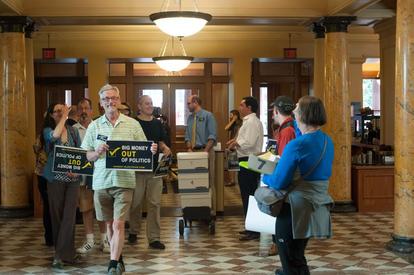 AfD co-chair David Delk joins in delivering ballot question petitions
AfD co-chair David Delk joins in delivering ballot question petitions In Portland, the Alliance for Democracy chapter worked to pass a city charter amendment establishing limits on campaign contributions/expenditures. The Honest Elections charter amendment will add donation limits to the city charter, including a $500 limit on donations from individuals, and a limit of $5,000 on loans from candidates to their own campaigns. It also mandates disclosure by name of funders for campaign ads and other communications, along with the industry they represent.
The measure passed 87% to 12%, with about three-quarters of the votes counted as of Wednesday.
This Portland ballot measure is based on an earlier county-wide ballot question, which passed in 2016 with almost 90% support. Unfortunately, implementation of this measure is currently tied up in the court system, where a judge has ruled that the measure's limit on individual donations is a violation of state protection of free speech.
Oregon is a campaign finance cellar-dweller, second only to Mississippi in terms of regulation, and scoring nearly straight Fs in a 2015 study of state anti-corruption initiatives. (The Koch-funded "Institute for Free Speech," on the other hand, gives Oregon an A for having the "best" system of campaign finance regulation, that is to say none).
As a result, it takes a lot of money to run for office in Oregon, with donations coming mostly from developers, timber companies, and finance. Oregon state legislature candidates raise and spend more money, per capita, than candidates in any other state, except for New Jersey.
In Massachusetts, several Alliance members worked on the “Yes on 2” campaign. Proposed by American Promise, Question 2 supports a federal amendment to overturn Citizens United, and creates a "citizen's commission" to "investigate and report on the effects Citizens United and similar court cases have had on our political discourse."
Massachusetts democracy activists remember how their legislature blocked a Clean Elections initiative, and how the state's public banking study commission was quickly dominated by big banks who decided a public bank was unnecessary. Having already passed more than 200 local resolutions for an amendment, they weren't surprised that Question 2 passed—with with 72% of the vote—but they expect the real campaign will be to get a commission appointed quickly, and have it include activists from grassroots groups. Stay tuned!

 RSS Feed
RSS Feed
